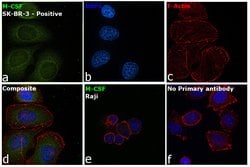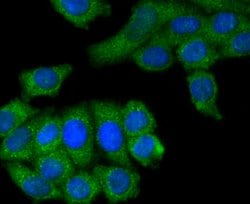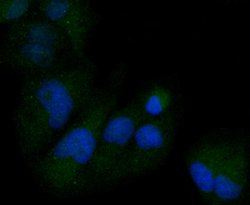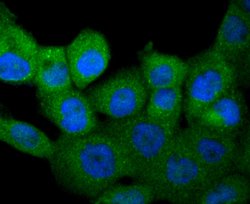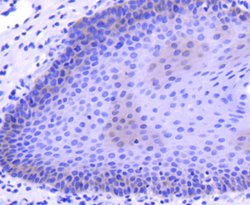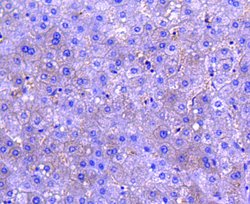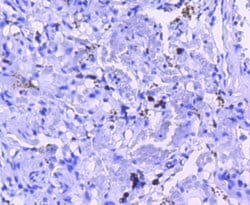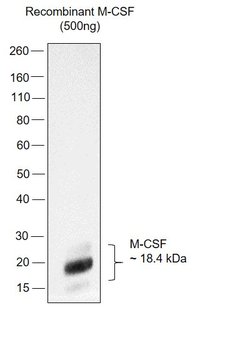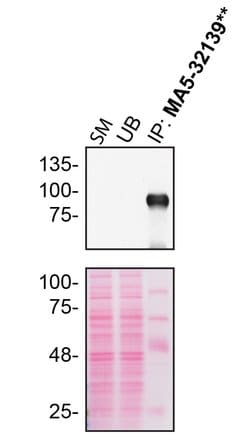Learn More
Invitrogen™ M-CSF Recombinant Rabbit Monoclonal Antibody (SU0413)
Rabbit Recombinant Monoclonal Antibody
Supplier: Invitrogen™ MA532139
Description
Recombinant rabbit monoclonal antibodies are produced using in vitro expression systems. The expression systems are developed by cloning in the specific antibody DNA sequences from immunoreactive rabbits. Then, individual clones are screened to select the best candidates for production. The advantages of using recombinant rabbit monoclonal antibodies include: better specificity and sensitivity, lot-to-lot consistency, animal origin-free formulations, and broader immunoreactivity to diverse targets due to larger rabbit immune repertoire.
M-CSF (Macrophage colony-stimulating factor, CSF-1) is a survival factor essential for the proliferation and development of monocytes, macrophages, and osteoclast progenitor cells. M-CSF also induces VEGF (vascular endothelial growth factor) secretion by macrophages, thereby mediating mobilization of endothelial progenitor cells and neovascularization. M-CSF is present as several bioactive isoforms that differ in potency and stability. The full-length protein is synthesized as a membrane-spanning protein that can be expressed on the cell surface or further cleaved and modified in the secretory vesicle. Further, M-CSF is a disulfide-bonded homodimer which is processed into one of two isoforms, a glycoprotein or a proteoglycan that has been modified by the addition of chondroitin sulfate to each subunit. Binding of M-CSF to its receptor, c-Fms (CSF-1R or CD115) induces dimerization of the receptor followed by internalization and degradation of the complex. Functionally, M-CSF is known to stimulate differentiation of hematopoietic stem cells to monocyte-macrophage cell populations in culture. M-CSF acts through the CSF receptor 1. Although human M-CSF shows activity on mouse cells, mouse CSF shows no activity on human cells.
Specifications
| M-CSF | |
| Recombinant Monoclonal | |
| 1 mg/mL | |
| TBS with 0.05% BSA, 40% Glycerol and 0.05% sodium azide; pH 7.4 | |
| P09603 | |
| Csf1 | |
| Synthetic peptide within Human MCSF aa 56-105. | |
| 100 μL | |
| Primary | |
| Human | |
| Antibody | |
| IgG |
| Immunohistochemistry (Paraffin), Immunoprecipitation, Western Blot, Immunocytochemistry | |
| SU0413 | |
| Unconjugated | |
| Csf1 | |
| C87615; colony stimulating factor 1; colony stimulating factor 1 (macrophage); colony-stimulating factor-1 splice variant; CSF1; CSF-1; Csfm; H-MCSF; lanimostim; macrophage colony stimulating factor 1; macrophage colony stimulating factor alpha; macrophage colony stimulating factor beta; macrophage colony-stimulating factor; macrophage colony-stimulating factor 1; macrophage colony-stimulating factor beta; macrophage-colony stimulating factor alpha; MCSF; MCSF alpha; MCSFBETA; MGC31930; M-MCSF; op; osteopetrosis; Processed macrophage colony-stimulating factor 1 | |
| Rabbit | |
| Protein A | |
| RUO | |
| 1435 | |
| Store at 4°C short term. For long term storage, store at -20°C, avoiding freeze/thaw cycles. | |
| Liquid |
Your input is important to us. Please complete this form to provide feedback related to the content on this product.
